Henri Le Tonnelier de Breteuil | |
|---|---|
 Breteuil in 1886 | |
| Born | 27 September 1848 |
| Died | 4 November 1916 (aged 68) |
| Occupation | Politician |
Henri Le Tonnelier de Breteuil (1848-1916) was a French aristocrat and politician.
Henri Le Tonnelier de Breteuil | |
|---|---|
 Breteuil in 1886 | |
| Born | 27 September 1848 |
| Died | 4 November 1916 (aged 68) |
| Occupation | Politician |
Henri Le Tonnelier de Breteuil (1848-1916) was a French aristocrat and politician.
Henri Le Tonnelier de Breteuil was born in 1848. [1] He was the son of Alexandre Le Tonnelier, Marquis de Breteuil (son of Achille Le Tonnelier de Breteuil), and his wife Charlotte-Amélie Fould, daughter of the financier Achille Fould.
Breteuil served as a member of the Chamber of Deputies, representing Hautes-Pyrénées. [1] He was a key negotiator in the Triple Entente. [1]
Breteuil resided at the Château de Breteuil. [2] He often invited his friend Marcel Proust, who based the character of Hannibal de Bréauté in In Search of Lost Time on him. [2] Breteuil commissioned architect Ernest Sanson to design his Hôtel de Breteuil in the 16th arrondissement of Paris, completed in 1892. [3]
On 3 March 1891, he married the American heiress Marcelite "Lita" Garner [4] , whose sister Florence Garner married the Scottish socialite Sir William Gordon-Cumming.
Breteuil died in Paris in 1916. [1]
Achille is a French and Italian masculine given name, derived from the Greek mythological hero Achilles. It may refer to:

Louis Charles Auguste Le Tonnelier, Baron de Breteuil, Baron de Preuilly was a French aristocrat, diplomat and statesman. He was the last Prime Minister of the Bourbon Monarchy, appointed by King Louis XVI only one hundred hours before the storming of the Bastille.
Louis Jean Victor Sévère Decazes de Glücksbierg, 4th Duc Decazes and 4th Hertig af Glücksbierg, was a French businessman and Thoroughbred racehorse owner and breeder.
Prince Louis Charles de La Trémoille, 9th Duke of Thouars, 8th Duke of La Trémoïlle, 11th prince de Tarente, 15th prince de Talmond and 15th Count of Laval was a French aristocrat and the son of Charles Bretagne Marie de La Trémoille and his third wife, Valentine Eugénie Joséphine Walsh de Serrant.
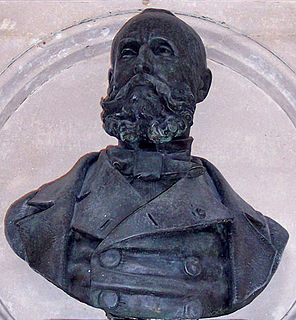
Hector-Martin Lefuel was a French architect, best known for his work on the Palais du Louvre, including Napoleon III's Louvre expansion and the reconstruction of the Pavillon de Flore.

Ernest-Paul Sanson was a French architect trained in the Beaux-Arts manner.

Paul François de Quelen de La Vauguyon or Paul François de Quélen de Stuer de Caussade, duc de La Vauguyon was a French nobleman. He was governor of Cognac, after having been involved in the last campaigns of the Seven Years' War. He wrote a Portrait de feu monseigneur le Dauphin and was menin to the future Louis XVI, one of the Dauphin's sons. A peer of France, brigadier, maréchal de camp, knight of the ordre du Saint-Esprit, he was chosen to be minister plenipotentiary to the Estates General of the Dutch Republic. He later became French ambassador to Spain, knight of the Golden Fleece, temporary minister of foreign affairs in 1789, then minister of the conseil d'État of Louis XVIII in Verona. He was the main intermediary among Louis's agents in France, but became the victim of intrigues. From the Restoration onwards he was lieutenant général and sat in the peerage of France, where he was noted for his moderation. He and his wife had four children, but the Quelen line died out with his children.
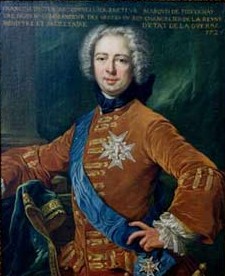
François Victor Le Tonnelier de Breteuil was a French nobleman. He was minister for war twice under Louis XV. He was also chancelier, garde des sceaux de la Maison de la reine and commander, provost and grandmaster of ceremonies to the Order of the Holy Spirit (1721–1743).

Louis Nicolas Le Tonnelier, Baron of Breteuil, baron of Preuilly and of Breteuil was an officer in the royal household of Louis XIV. He is also notable as the father of the mathematician Émilie du Châtelet.
The Minister for the Maison du Roi was a cabinet role under the French monarchy, conferring leadership of the Maison du Roi.

Louis-Marie-Florent de Lomont d'Haraucourt, marquis later duc du Châtelet, was an aristocratic French Army general and diplomat of the Ancien Régime.

Jules de Rohan was Prince of Guéméné. Born in Paris, he died in Carlsbourg.

The Fould family is a family of French Jewish descent known for success in banking. It was founded by Beer Léon Fould, a wine-dealer's son from Lorraine, who moved to Paris in 1784 to establish a banking business. The name comes from the Hessian city of Fulda.
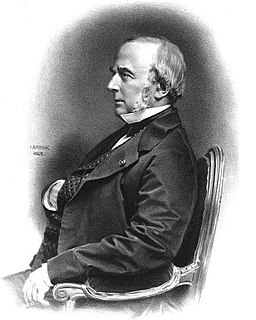
Adolphe Vuitry was a French lawyer, economist and politician. He became recognized as an expert on finance. He was governor of the Banque de France from 1863 to 1864, then Minister-President of the Conseil d'Etat from 1864 to 1869. In his later years he devoted himself to historical studies, publishing many works on medieval and modern finance.

The Château du duc d'Épernon is a château, built on the site of a medieval castle located in Fontenay-Trésigny, in the Brie region of France, 43 km (27 mi) southeast of Paris. It stands alongside the Bréon stream and next to the Church of Saint-Martin, in the heart of a once walled old town, the history of which is closely linked to the history of the château. The castellans were lords of Fontenay-en-Brie during the Old Regime.
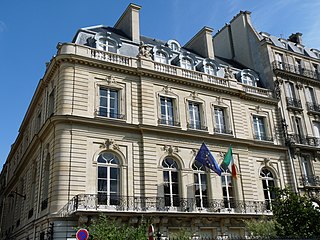
The Hôtel de Breteuil is a historic building in the 16th arrondissement of Paris, France.

Achille Le Tonnelier de Breteuil (1781-1864) was a French politician.
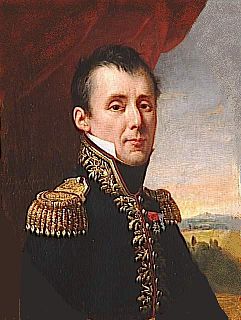
Armand-Maximilien-François-Joseph-Olivier de Saint-Georges, viscount and marquis of Vérac, was French soldier and politician of the eighteenth and nineteenth centuries. He was born on August 1, 1768 in Paris and died on August 13, 1858 in his château in Temblay-sur-Mauldre.
Étienne Cochard de Chastenoye was a French colonial soldier who was interim governor of Saint-Domingue (Haiti) three times in the 18th century.